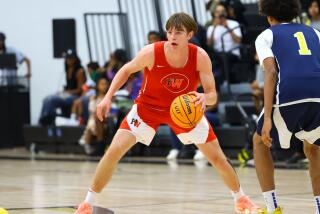Switching to Right Team Leads Once-Wayward Teen to College
- Share via
Deonta Black was hanging with gangbangers and selling weed around Perris just a few years ago, trying to scrape together what he calls a “little fame on the streets.”
The 18-year-old landed in juvenile hall for nine months. He was angry. He talked back. So authorities shipped him to Optimist Youth Homes & Family Services, a Highland Park group home for at-risk or abused kids -- many of whom are on probation -- to finish high school.
Two years later, Black had his diploma, a couple of MVP titles and a sharp prom photo for his efforts. And in a few weeks, Black will leave for a place no one in his family has ever been: college.
His mother is excited but not surprised.
“I knew he’d make it,” said Eugenia Jones, 35.
Josh Dunaj, an assistant basketball coach at Citrus College in Glendora, met Black this summer and saw potential. The 6-foot-6 shooting guard’s run-ins with the law didn’t concern Dunaj, who was more impressed with Black’s athleticism and the way he turned his life around.
“I know he’s had some problems,” said Dunaj, the new assistant coach at the community college. “I really believe he’s a really good, kindhearted kid.... I think he’s got a chance to be a very good basketball player as well. That’s all secondary just to make sure he’s on the right path in life.”
Black’s long arms and rebounding ability stood out enough that Dunaj offered him a golden ticket: a spot on the Owls squad and a shot at a college education.
“You feel like you’re living your dream,” the teenager said.
When Black stands up and unfolds his lanky arms and legs, the results are slightly startling. A wiry 189 pounds, Black looks shyly down on the world below, his lean body concealed in an oversized T-shirt and jeans.
Strangers walk up to him at Wal-Mart: “You’re tall. Do you play basketball?”
Black likes the attention, even when it embarrasses him.
It’s better than when his parents, who weren’t married, were fighting over custody of him, or when he tried to live in Moreno Valley with the father he didn’t know very well. Better than when he felt he couldn’t tell his mother anything and she kept fussing at him about that diploma.
“He was a pretty shut-down kid, kind of depressed,” Alan Eskot, director of education at Optimist High School, which is run by the group home, said of Black when he first arrived on campus. Early on, Black picked a fight with another gang member in the gym.
“Every day there it was, like, stressful,” Black said. “Wondering how my mom was doing. I was real mad I had to go. I didn’t want to go. I felt that L.A. was too far away from home.”
Then he decided to work with the system rather than fight it.
“If I want to get up out of here and do the things I want to do, I have to be accountable,” Black said.
After that revelation in the fall of 2003, Eskot said, “he really blossomed.” The high school teaches 200 students with behavioral and other problems, the administrator said, noting that more than half live in housing on the site.
Black juggled classes with a job at the local Super 8 grocery store and playing basketball for the Optimist Stars and later the Eagle Rock High School Eagles when he was dual-enrolled at the public school his senior year. This season, he made Los Angeles’ all-city second team.
“I was always a good kid,” Black said. “I was hanging out with the wrong people.”
Coaching him in summer tournaments, Dunaj has seen what can happen when Black surrounds himself with healthier influences.
“You could seem him brighten up,” Dunaj said. “He became a good teammate.... He just has a great attitude.”
Citrus’ program is one that emphasizes academic achievement and pushes its players on to four-year schools, Dunaj said. The college was introduced to Black through basketball, Dunaj said, but “we hope to help him with a lot more than that.”
Black has hopes of playing professionally but also has a backup plan to earn a business degree and run his own business in case NBA dreams don’t materialize. He models his game after hero Tracy McGrady, the Houston Rocket, who doesn’t play cocky “but can take over the game whenever he wants,” Black said.
His mother teased him as the two lounged in her Hemet apartment, pride flashing in her eyes.
“Makes me feel like I’m sitting with Kobe already,” Jones said, laughing. “He doesn’t like it when I say that.”
Without basketball, Black said, there would be no college.
“They know I ain’t gonna mess this up,” Black said. “I want this real bad.”
More to Read
Get our high school sports newsletter
Prep Rally is devoted to the SoCal high school sports experience, bringing you scores, stories and a behind-the-scenes look at what makes prep sports so popular.
You may occasionally receive promotional content from the Los Angeles Times.





